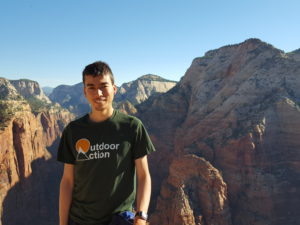Hi! I am from Philadelphia, USA and currently completing an MPhil in Environmental Change and Management at Oxford. Previously, I did my undergraduate studies in environmental engineering at Princeton University, where my research focus was on the environmental trade-offs to agricultural expansion in Zambia. My interests lie at the intersection of environmental science and coding, and I have enjoyed using the ‘big data’ made available by remote sensing to observe how humans are shaping the world around them on a large scale. More recently, I have become more interested in the actual interaction between humans and their environment, particularly in Indigenous communities and through traditional ecological knowledge. These pursuits have come together in my current research project, which seeks to understand how reindeer herding, practiced by the semi-nomadic Nenets people on the Yamal peninsula may be altering or mitigating expected Arctic vegetation change due to climate change.
In Svalbard, I am excited for my first Arctic experiences. Although I’ve always been personally interested in the Arctic, it has only recently become an academic interest of mine, so I am especially looking forward to doing fieldwork in Svalbard. On the course, I hope to improve my knowledge of ecology and become much more aware of the importance and use of plant traits in answering research questions. I will be satisfied if after the course, I can articulate how I might incorporate plant traits into the methodology of my own project. In addition, I am looking forward to meeting the international cohort and learning from the research and experience of the course leaders. I am also excited to work with my team through a full research cycle of developing a question, collecting and analysing data, and exploring, discussing, and presenting the results. Most of my past fieldwork has been more focussed on geology, rather than ecology, so I can’t imagine a better introduction to ecological fieldwork than this course.
I anticipate that most people in Svalbard will believe that climate change is occurring and that its primary cause is anthropogenic carbon emissions. As an American, I have found that this opinion is more widespread in Europe than in the US. Moreover, the Arctic has been warming more rapidly than the rest of the planet with extreme anomalies that could hardly be ignored. However, I also know that Svalbard has significant oil reserves, so I wonder whether there may be people working for drilling companies whose opinion may be shaped by their profession.
In the US, people hold a range of opinions about climate change, including those who believe it’s not happening, that it’s not caused by humans, that it’s only a minor problem (compared to terrorism, immigration, etc.), and that it requires urgent action. While most people in my academic circles at university were of the latter belief, I also spent a summer canvassing for Environment America, in which I went door-to-door in my hometown talking to people and encouraging them to sign environmental petitions. I found that many people chose not to form their opinion based on the evidence, but rather reached for evidence that supported their preconceived conclusion. Climate change deniers tended to be Trump supporters who would argue that humans couldn’t have such an impact on our large planet or that the concept was some kind of scam to give the government more control. One man even knew what the Milankovitch cycles are and offered that as evidence that climate change is mostly natural. Many others did believe that anthropogenic climate change was a problem, although few were optimistic about the future. I find it disappointing that climate change has become a political issue in the US since science should not be partisan, but I am optimistic that opinions will change as going green continues to become more economically viable. I look forward to discussing these issues further within a great couple of weeks learning about plant traits in Svalbard!
